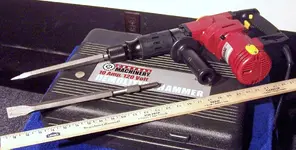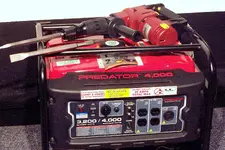GG, Please be careful with your new toys! Safety First. I went though a six month school in the US Navy that exceeded a two year degree in electrical degree. The instructors would joke about how you have not been bitten till some 400 hertz zapped you once. I never had that pleasure as they say, Thank GOD! 120 volts 60 hertz is one of the most dangerous currents that can get a hold of you! It will grab you and hold one while 220/240 will kick the crap out of you and go HA HA. Some of this stuff below is common sense but when we are out working, get excited or in a hurry we some times forget. (Working, when you enjoy doing something most of the time it is never work!)
Make sure you get a quality 15 amp #12 GFCI, extension cord and you want the GFCI at the generator not at your tool. You can purchase a 100 foot cord with the GFCI circuit built in and that is best if you are going to be a long distance. Depending on how long the extension cord is you will need to go bigger. A 12 gauge is rate for 15 amps 100 ft a max. You can ignore this rating and it will shorten the life of your equipment. With your 10 am draw on the drill I would stay with in a 150 foot with a 12 gauge cord with two connections if possible, 3 at the very max if you have the short GFCI cord at the gen. Any longer than 100 ft I would go to get one length of 12ga cord to 150 ft max and buy the waterproof connections for it. Any more than that you will need to go to a solid 10 gauge extension cord with no connections. I do not buy the cheapest extension cords, all of my outside cords are 12 gauge yellow jacket. Also for added safety I make a loop when I join extension cords so they do not come undone and pull on the joints, like your going to tie your tennis shoes. If it is wet around where your working I would use some rubber electric tape and tape up any connections with two layers of tape. Pull on the tape as you put it on to make it bond to the other layer. I would get a 12 ga 100 ft and a 50 ft, and use one or the other. You want to have the Gen as close to the work as possible. Each connection creates resistance in the cords. It would be a good idea to keep one or two rolls of the rubber electric tape handy when you are using this...
Any cracks in the outside casing on the cords I would use a three to four layers of the rubber electric tape to fix the crack. Tape around one foot total or six inches on each side of the break with half over laps. If the insulation on the wire is broken I would cut the cord in to at the break and two cords out of it. Then I would purchase a new longer extension cord. If out in the field you can tape up the broken wire, then put some added tape around the casing but I would replace it ASAP.
Here are a couple links from Amazon... I would not buy any cords from ebay! Some on the cords sold on there are not rated for sale in our Country. They are very cheaply made and dangerous.
Yellow Jacket 2817 12/3 SJTW In-Line GFCI with Lighted End, 2-Feet - Amazon.com
Scotch Rubber Mastic Electrical Tape, 1-Inch by 10-Foot by .065-Inch - Amazon.com
I would make sure the cords stay out of puddles of water at all times, get you some 1/4" string and tie them up on something. I saw a man step into a puddle of water on a job site once... Something I never want to see again! Remember if someone is being shocked do not touch them! Best to cut the power source as fast as possible. Any shocks please seek medical attention at once. Go get checked out because you may feel & seem fine right then... Then you could drop dead a few hours later from Heart rhythm problems.
Congrats on your new toys!
Jerry










